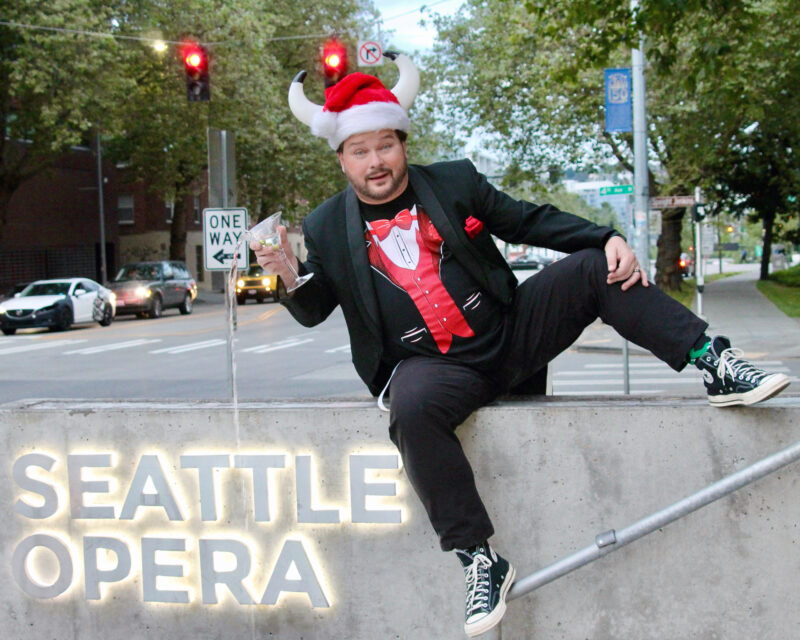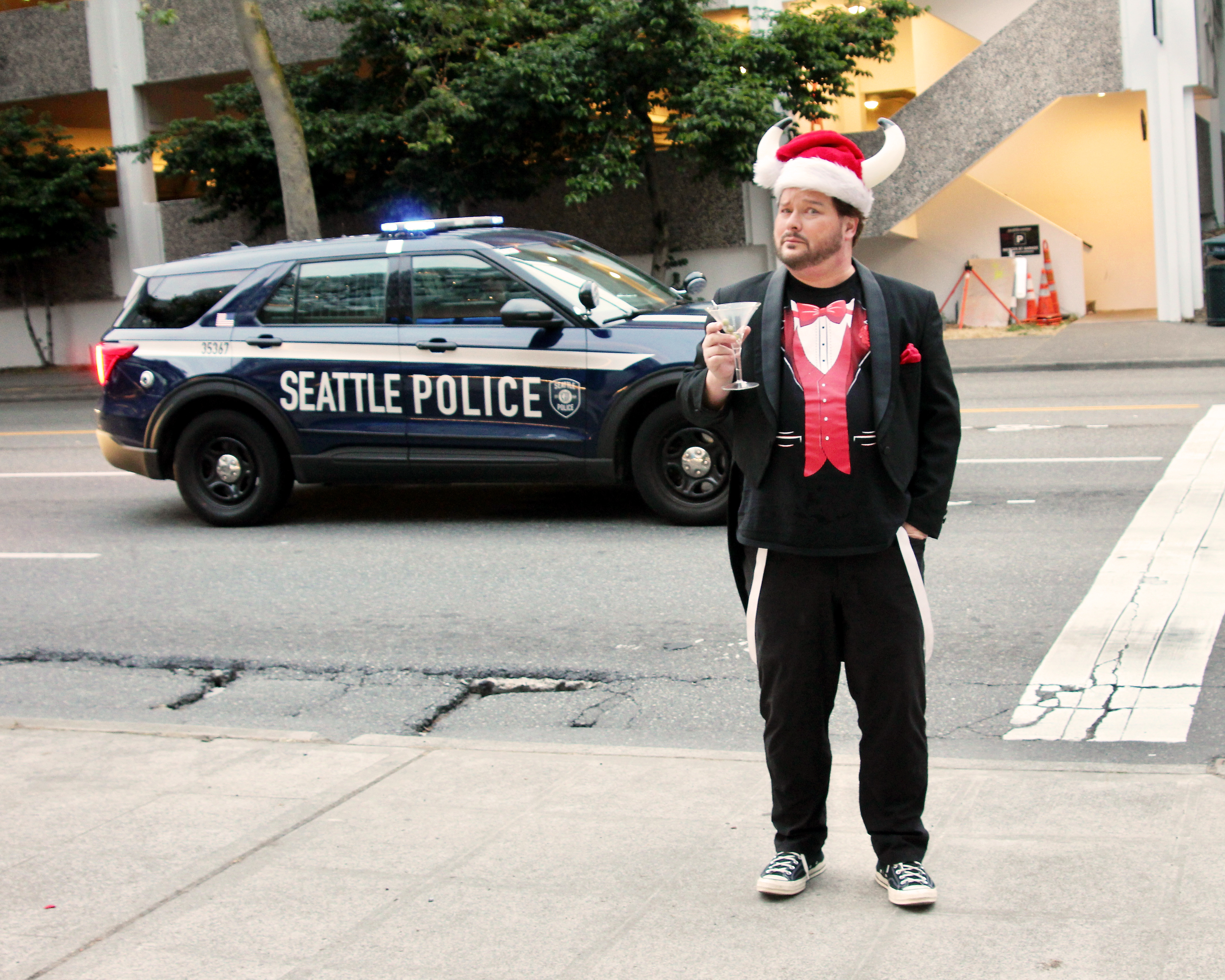A Sober Look at "A Very Drunken Christmas Carol"
Review of A Very Drunken Christmas Carol at Seattle Opera
Written by Teen Writer Roy Callahan and edited by Yoon Lee

Seattle Opera’s A Very Drunken Christmas Carol is a festive and chaotic journey through the world of opera. The audience follows the Drunken Tenor, a talented and recognized singer who’s fallen into the bad habit of arriving to shows unprepared, stressing out his duet partners, and drowning himself in alcohol. After yet another messy performance, the opera star is called on by a mysterious voice and thrust into the classic trials of the Christmas Carol. Though an appealing concept, the opera suffers greatly from poor plot development and mediocre comedy, leaving audiences with a heaving pile of disappointment.
The Christmas Carol archetypes of past, present, and future underpin a widely underwhelming story which does nothing to grip the audience. Jumping into the past we meet an innocent Tenor who enters the opera scene under questionable guidance from his mentor and partner, the Baritone. The Baritone passes on his dubious habits of carrying a flask at all times, offering sips before performances for extra confidence, and entering duets wholly unprepared. This easily predictable storyline carries no energy, simply serving as an unsatisfying and unoriginal plot point. The lack of chemistry and heavy-handed dialogue between the tenor and the Baritone further weakens the story.

Turning to the present we see the Tenor’s current partner, the Soprano, suffering from intense pressure as the drunk prodigy surprises her with wild new lines or songs seconds before each performance. The stress finally breaks her as she confronts the Drunken Tenor with a rebellious exit song before abandoning him on the stage. Unconvincing acting from the Soprano leaves the emotion of the scene feeling forced, while her song serves as a victorious anthem even though no satisfying victory is in sight.
Stuck in between each of these time-jumping trips are long interludes of meaningless monologues and songs from across the opera landscape, extending the show to a mind-numbing two hours and twenty minutes. Speeches about Simon Cowell entering the opera industry or opera directors having vast wealth and power lead into performances of both opera classics and pop blend comedies. Though some interludes carry brief gems of entertainment, the fact that they add on so much runtime when they could be cut, leaves each interlude feeling like an unwelcome interruption instead of a fun splash of plot relief. In an effort to add a skit-like element to the show, the writers unwittingly created an overly long opera which ultimately detracts from the story and viewing experience.
The plot’s final sin is its terribly underwhelming conclusion. A mysterious consequence of the Drunken Tenor’s actions is alluded to by the magical voice at the start of the show. When we finally arrive to see the Tenor’s grim future, the great consequence is unveiled as a lackluster opera singing robot. The Tenor stumbles about the stage singing a duet with the opera bot, whose clunky movements, mechanical voice, and programmed sayings are supposed to serve as some form of comedy. By the end of the duet, the Tenor’s unpredictable nature makes the robot malfunction, revealing that not even a computer can stand being the Tenor’s opera partner. Unsurprisingly, this random inclusion of an operatic robot and its trite physical comedy has no connective tissue with the rest of the story, becoming more of an embarrassment than anything else.
Following the wrap-up of the three Christmas Carol stages, the Tenor undergoes his transformation. He sings his heart out about his separation from family as he chased his career, the loneliness of stage life, and the fact that he has more performance behind him now than in front. However, these realizations carry no observable ties to the previous story points about the trials of partnership in the opera industry. It’s hard to feel for the Tenor when all the gripping elements of the story are saved for the closing monologue. In addition, sitting through a drawn out and dull three quarters of the show with no significant or emotional development leaves this passionate, expressive end to fall flat.
In addition to the plot’s failure, one of the show’s biggest flaws is its tedious comedic repetition. The show’s comedic elements such as the opera mentor reading his lines from handwriting on his arms and paper slips hidden in his shoes, or the Drunken Tenor showing up to perform in a variety of unorthodox costumes such as an inflatable dinosaur, or a puffed up muscle suit with fake gold hair, are funny at first, but quickly turn dull as they are repeated over and over throughout the same song. Watching an opera singer read lines off his arm only carries its novelty for a short while before it becomes old.
The music is the one upside of the show. From the first song, the Tenor, Soprano, Baritone, and Mezzo showcase their vocal prowess and operatic technique. Their talent on stage carries each song, with no noticeable voice cracks, off notes, or other mistakes. In addition, the show’s operatic pop covers create hilarious song blends, which stand out in a comedic and impressive way. Watching professional opera singers with passionate faces sing songs like “Last Christmas” by Wham! and “Never Gonna Give You Up” by Rick Astley is a humorous contrast which provides some entertaining relief from the main story.
Overall, a few laughs and a couple of entertaining pop opera blends don’t save this show from becoming a slow drag. With stretched-out comedy, an underwhelming, unsatisfactory plot, and an obscenely long run time for a show of such little substance, A Very Drunken Christmas Carol provides an unmemorable performance. Though it isn’t completely terrible, the show’s mediocrity makes it not worth anyone’s time.
A Very Drunken Christmas Carol took place at Seattle Opera on December 9 - 18, 2022. For more information see here.
Lead Photo: The Drunken Tenor (Robert McPherson) in A Very Drunken Christmas Carol. Photo courtesy of Seattle Opera.
The TeenTix Newsroom is a group of teen writers led by the Teen Editorial Staff. For each review, Newsroom writers work individually with a teen editor to polish their writing for publication. The Teen Editorial Staff is made up of 6 teens who curate the review portion of the TeenTix blog. More information about the Teen Editorial Staff can be found HERE.
The TeenTix Press Corps promotes critical thinking, communication, and information literacy through criticism and journalism practice for teens. For more information about the Press Corps program see HERE.


